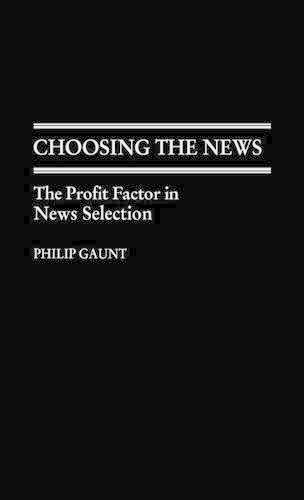
Choosing the News: The Profit Factor in News Selection
(Hardback)
Publishing Details
Choosing the News: The Profit Factor in News Selection
By (Author) Philip Gaunt
Bloomsbury Publishing PLC
Praeger Publishers Inc
8th February 1990
United States
Classifications
Tertiary Education
Non Fiction
070.4332
Physical Properties
Hardback
193
Description
This book presents a comparative study of foreign news coverage in regional newspapers in the United States, Britain and France. Journalistic images are quite distinct in these countries, but the news content in general, and foreign news in particular, appear to be remarkably uniform. Why is this so This book proposes a taxonomy of factors affecting the selection of foreign news, showing how different groups of factors interact with each other. The book argues that, while profit may have become an invisible gatekeeper in the process of news selection, there are no alternative sources of media-funding that would be acceptable in democratic societies.
Reviews
Growing out of his PhD research, Gaunt's work focuses upon a specific area of news comparison: the selection of foreign news in regional newspapers in France, the UK, and the US. A preliminary literature review reveals that no previous work with this specific focus has been carried out. Gaunt uses three distinct methods: content analysis, participant observation, and surveys of three regional newspapers over a two-week period in 1987. He argues that there are very few differences in subject matter in foreign news coverage. Such uniformity, he argues, is prompted by three factors: management, professionalization, and the agenda-setting role of news agencies. Increasing competition has encouraged profit-conscious managers in three countries to introduce controls and procedures that tend to standardize news selection procedures. Gaunt's study, then, supplies yet another confirmation of the thesis that economics is the principal determinant that shapes and homogenizes the news (cf. E.S. Herman and N. Chomsky's Manufacturing Consent, 1988). Well organized and easy to follow, the book would be appropriate for graduate students and upper-division undergraduates.-Choice
"Growing out of his PhD research, Gaunt's work focuses upon a specific area of news comparison: the selection of foreign news in regional newspapers in France, the UK, and the US. A preliminary literature review reveals that no previous work with this specific focus has been carried out. Gaunt uses three distinct methods: content analysis, participant observation, and surveys of three regional newspapers over a two-week period in 1987. He argues that there are very few differences in subject matter in foreign news coverage. Such uniformity, he argues, is prompted by three factors: management, professionalization, and the agenda-setting role of news agencies. Increasing competition has encouraged profit-conscious managers in three countries to introduce controls and procedures that tend to standardize news selection procedures. Gaunt's study, then, supplies yet another confirmation of the thesis that economics is the principal determinant that shapes and homogenizes the news (cf. E.S. Herman and N. Chomsky's Manufacturing Consent, 1988). Well organized and easy to follow, the book would be appropriate for graduate students and upper-division undergraduates."-Choice
Author Bio
PHILIP GAUNT is a Visiting Professor in the School of Journalism at Indiana University. He has also been a journalist, a public relations consultant, and a media specialist with UNESCO.
